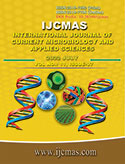


 National Academy of Agricultural Sciences (NAAS)
National Academy of Agricultural Sciences (NAAS)

|
PRINT ISSN : 2319-7692
Online ISSN : 2319-7706 Issues : 12 per year Publisher : Excellent Publishers Email : editorijcmas@gmail.com / submit@ijcmas.com Editor-in-chief: Dr.M.Prakash Index Copernicus ICV 2018: 95.39 NAAS RATING 2020: 5.38 |
In the present study evaluated sleeve gastrectomy as bariatric intervention in castrated, non-castrated obese dogs by estimating biochemical characteristics in the blood and complications after an operation. Twenty obese dogs (10 castrated and 10 non-castrated) were subjected to open sleeve gastrectomy. The complications were inspected, observed and registered on days 1, 3, 7, 10, 14, 21, 30 after sleeve gastrectomy per day. Estimated biochemical characteristics (cholesterol and trigelcrides) in castrated, non-castrated obese dogs at 1, 2, 3, 4, 5, 6, 7, 8, 9, 10, 11, 12, 13, 14 weeks after operation. After sleeve gastrectomy, complications were more obvious in castrated obese dogs than non-castrated obese dogs. Post operation, the average cholesterol and triglyceride in the blood are higher in castrated obese dogs than in non-castrated obese dogs, with no statistically significant differences at a significant level (.05). No significant difference was observed between the average cholesterol and triglycerides in the blood after sleeve gastrectomy in obese castrated and non-castrated dogs. It was very clear that there was an increase in the complications of sleeve gastrectomy in castrated obese dogs compared to non-castrated obese dogs.
 |
 |
 |
 |
 |